The power of Vitamin C for acne, scars, and blemishes is undisputed - even dermatologists recommend it! It also protects your skin from pollution and UV radiation. In fact, the benefits of Vitamin C serum for the face can help you get that fresh, clear, and youthful glow you always wanted!
A vitamin C serum for the face might be an excellent addition to your skincare regimen. Vitamin C, commonly known as ascorbic acid, is a powerful antioxidant with several skin advantages, including brightening, free radical protection, and collagen formation. This article provides a comprehensive approach to utilising vitamin C serum on your face.
Quick facts: All about Vitamin C serum
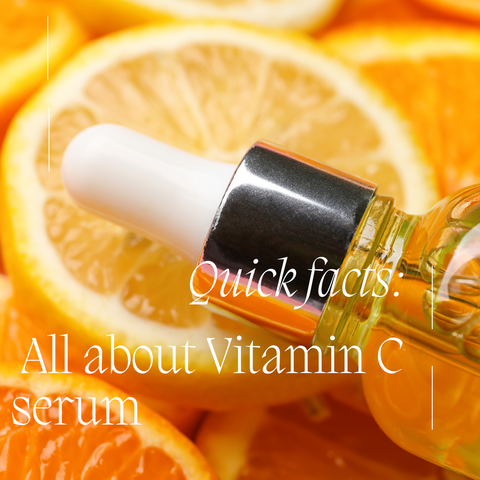
-
Vitamin C serum uses: Gives the skin a more radiant and brighter appearance, along with anti-aging and anti-pigmentation effects.
-
Vitamin C serum benefits: Improves collagen production to give brighter and even-toned skin, while reducing the appearance of wrinkles and healing wounds.
-
Suitable skin types: You can use Vitamin C serum for oily skin, dry skin, and combination skin
-
Vitamin C serum side effects: While completely safe to use in most cases and recommended by dermatologists, it can cause redness, skin irritation, and itchiness in some.
Top 5 benefits of Vitamin C serum for face

The use of vitamin C serum for the skin and face is multi-beneficial. This means that when using a Vitamin C serum benefits appear on your skin in multiple ways. These advantages make vitamin C serum an important addition to your skincare routine, especially for those trying to maintain healthy, youthful skin and address common skin concerns such as pigmentation, aging, and environmental damage. To maximise its advantages, use vitamin C serum consistently and in conjunction with other skincare practises such as sunscreen and a well-balanced skincare regimen.
#1 Treats under-eye dark circles
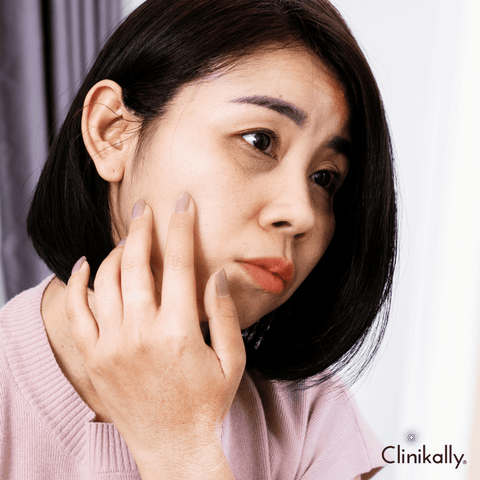
Your Vitamin C face serum can help hydrate the areas under the eye. As a result, it will help prevent the redness or discoloration that are common signs of under-eye dark circles caused by fatigue. If you have tired or puffy-looking eyes due to lack of sleep, then applying Vitamin C serum regularly will start lightening your dark circles within a day or two! We're not saying sufficient and healthy sleep isn't necessary - but your Vitamin C skin serum can be exactly what you need!
To some extent, vitamin C serum can help reduce the appearance of under-eye dark circles, especially if they are caused by pigmentation or skin thinning. Vitamin C can help treat under-eye dark circles by reducing pigmentation, strengthening the skin, reducing inflammation, and protecting against UV damage. While vitamin C can help reduce under-eye dark circles, it's vital to keep your expectations in check. Dark circles may not always disappear completely, especially if they are caused by genetic factors or underlying medical conditions. However, including a vitamin C product in your skincare routine will help improve the appearance of your under-eye area and contribute to a brighter, more refreshed appearance.
#2 Reverses signs of ageing - literally!
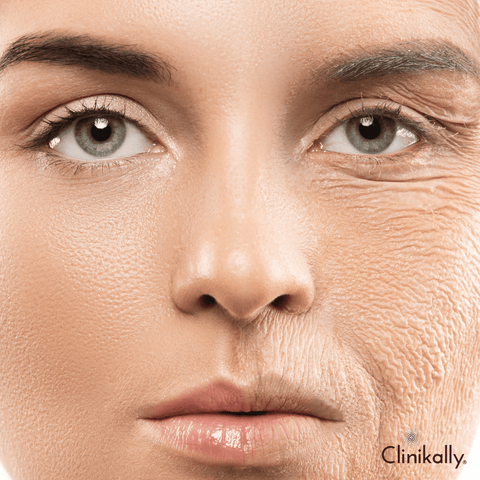
Vitamin C has potent antioxidant properties that aid in the prevention of oxidative skin damage caused by aging. Therefore, your Vitamin C face serum will effectively reduce fine lines, wrinkles, and other signs of aging on the skin - giving your skin a youthful glow!
While various skincare products and components can enhance skin appearance and lessen apparent indicators of aging, such as fine lines, wrinkles, and age spots, they do not "literally" reverse the aging process. Skin aging is a natural biological process that happens over time and cannot be completely reversed. However, certain skincare products, such as retinoids, antioxidants such as vitamins C and E, peptides, and hyaluronic acid, can help reduce the appearance of aging indications and enhance the overall health and texture of the skin. Here's how these components work:
-
Retinoids: Retinoids, including retinol and prescription-strength retinoids, accelerate cell turnover and stimulate collagen formation. This can result in smoother, firmer skin as well as a reduction in the visibility of fine lines and wrinkles.
-
Antioxidants (e.g., Vitamin C and E): Antioxidants protect the skin from free radical damage, which accelerates aging. They can lighten the complexion, erase age spots, and smooth out fine wrinkles.
-
Peptides: Peptides are tiny proteins that aid in collagen formation and skin suppleness. They can improve skin texture and lessen the visibility of fine wrinkles.
-
Hyaluronic Acid: Hyaluronic acid is a naturally occurring component of the skin that aids in moisture retention. Using hyaluronic acid-containing products helps moisturise the skin and reduce the appearance of fine lines and wrinkles.
To get the best results in minimising the signs of aging, stick to a skincare programme that incorporates these components on a regular basis. While these products can make a significant difference, they cannot stop or reverse the natural aging process. Other therapies, such as minimally invasive procedures (e.g., Botox, dermal fillers) or more invasive treatments (e.g., laser therapy or plastic surgery), may be considered for greater anti-aging results. A dermatologist or skincare professional can assist you in developing a personalised anti-aging plan that is tailored to your unique goals and needs.
#3 Protects from sun UV damage

Exposure to the sun's radiation can lower our body's Vitamin C levels. In fact, sun-damaged skin has been found to usually have a lesser concentration of Vitamin C, which can lead to free radicals stealing electrons from the skin cells, leading to skin damage.
Being a rich source of antioxidants, the use of Vitamin C serum allows the free radicals to get electrons, thus protecting your skin from sun damage and even reversing it. As per dermatologists, Vitamin C serum works best for sun-damaged skin when used in combination with sunscreen. It's crucial to use sunscreen for sun protection - especially if you are stepping out into the summer heat this summer!
Here are some ways vitamin C can help protect your skin from UV damage:
-
Neutralises Free Radicals: The sun's UV rays cause the skin to produce free radicals, which can lead to oxidative damage and early aging. Strong antioxidant vitamin C reduces the damaging effects of free radicals on the skin by neutralising them.
-
Reduces Sunburn and Redness: The anti-inflammatory qualities of vitamin C can aid in the reduction of sunburn and redness brought on by UV exposure. It might offer some respite from the direct consequences of sun exposure.
-
Reduces Dark Spots and Pigmentation: UV light exposure can cause pigmentation problems like age spots and sunspots to appear. By blocking the synthesis of melanin, vitamin C can aid in the reduction of these dark spots.
-
Encourages the Production of Collagen: UV rays can cause the skin's elastin and collagen fibres to break down, causing wrinkles and sagging. Vitamin C promotes the production of collagen, which helps to maintain the elasticity and firmness of the skin.
While vitamin C can offer some UV protection and healing, it should be used in conjunction with sunscreen for complete sun protection. Wear sunscreen, reapply sunscreen, seek shade, wear protective clothes, minimise sun exposure, and stay hydrated—all important practises for protecting your skin from UV damage. Although vitamin C is a crucial part of an all-encompassing skincare regimen, it works best when combined with other sun protection measures to effectively shield your skin from UV ray damage.
#4 Fades hyperpigmentation

Hyperpigmentation can be a massive problem for many - in the form of melasma, age spots, and sunspots. Hyperpigmentation occurs when melanin is produced in extra quantities in some areas. Even when your acne is healing, you will be prone to hyperpigmentation. You can use Vitamin C serum on your face to treat many different kinds of pigmentation and spots on your skin. For best results against pigmentation, dermatologists at Clinikally are recommending using an effective anti-pigmentation cream like Clinikally Pigment Corrector Cream. It is effective against all types of pigmentation, including melasma, which is known to be hard to treat.
This is how vitamin C can aid in the fading of hyperpigmentation:
-
Vitamin C Inhibits Melanin Production: Tyrosinase, the enzyme responsible for producing melanin, or skin pigment, is inhibited by vitamin C. Vitamin C can lessen the synthesis of melanin by blocking this enzyme, which will result in a more even skin tone.
-
Brightens Skin: Vitamin C can brighten the complexion and give the skin a more radiant appearance by promoting a more uniform distribution of melanin and reducing excess pigmentation.
-
Reduces Dark Spots: Vitamin C is especially effective at fading dark spots, age spots, and sunspots, all of which are common types of hyperpigmentation. The use of vitamin C on a regular basis can significantly reduce the appearance of these spots.
-
Reduces Inflammation and Redness: Inflammation and redness can occasionally accompany hyperpigmentation. The anti-inflammatory properties of vitamin C can help reduce these symptoms and promote a more even skin tone.
Choose the correct vitamin C product, perform a patch test, cleanse your face, use the product, use sunscreen, be patient and consistent, and visit a physician to utilise vitamin C to remove hyperpigmentation effectively. When it comes to erasing hyperpigmentation and achieving a more even skin tone, vitamin C is a helpful addition to your skincare routine. It can help prevent new pigmentation disorders from emerging when taken in conjunction with other sun protection techniques.
#5 Treats acne without any scarring

Vitamin C helps to lower the regulation of Tyrosinase naturally. Therefore, the use of Vitamin C serum on the face will help to prevent melanin synthesis. This helps to lessen dark spots and hyperpigmentation of different types. If you have acne, applying Vitamin C serum to your skin can be pretty beneficial.
If you are harnessing the benefits of Vitamin C for acne, you can get better results by combining it with a Niacinamide serum for acne. Applying Niacinamide serum to your face will help you get soft, clear, and even-toned skin - and best of all, it's going to cure pimples and other acne-related problems without any scarring!
Vitamin C can help prevent or minimise acne scarring by having anti-inflammatory qualities, promoting healing, brightening post-inflammatory hyperpigmentation, and protecting against UV damage. While vitamin C can be a helpful component of your acne management and scar prevention skincare routine, it's important to approach acne holistically, taking into account other factors such as proper cleansing, the use of acne-specific products, and lifestyle choices to effectively manage and prevent acne and acne scarring.
How to use Vitamin C serum for skin benefits

Whether you make Vitamin C serum at home or get a dermatologist-recommended Vitamin C face serum online, it's best to understand how to use Vitamin C serum for face and skin benefits beforehand. For the most effective results, the Vitamin C serum for the face is used as the base layer in any skincare routine. Follow the following steps when using your Vitamin C serum.
-
Step 1: Take your Vitamin C face serum and apply it in a small quantity to the face or affected area.
-
Step 2: Massage gently using circular motions of your fingers, until it is completely absorbed into the skin
-
Step 3: Apply moisturiser to your face. (It's important to use the moisturiser after applying the Vitamin C serum to your face.)
-
Step 4: For best results, use your Vitamin C serum every day and apply an effective sunscreen before stepping out into the sun!
Skin creams, lotions, and serums containing Vitamin C can be purchased online from one of India's skincare businesses. You can experience the benefits of Vitamin C for the skin along with other skin-hydrating and skin-nourishing substances by utilising dermatologist-recommended cosmeceuticals for the skin.
Make your own Vitamin C serum at home!

While many skin creams and serums have Vitamin C as an active and main ingredient, it is possible to make Vitamin C serum at home - with the things readily available in most Indian households!
Ingredients needed to make Vitamin C serum at home:
-
Vegetable glycerine
-
Rosewater
-
Glass dropper
-
Vitamin C powder
Easy steps to make Vitamin C serum at home:
-
Pour a teaspoon of rosewater into a bowl.
-
Add a few pinches of Vitamin C powder to it and stir.
-
Add one teaspoon of vegetable glycerine to it.
-
Keep it in the refrigerator for some time and allow it to cool
-
Your homemade Vitamin C skin serum will be ready for use!
While it is feasible to make your own vitamin C serum at home, it is important to note that commercial vitamin C serums are designed with stable ingredients and are tested for safety and efficacy. Consider utilising a professionally prepared vitamin C serum if you have specific skin concerns or require a product with a longer shelf life.
Note: People who have sensitive skin should keep tabs on the amount of Vitamin C powder they are using since using too much can cause itchiness or skin redness. One of the best ways to reduce skin itchiness is to pour a few drops of Aloe vera gel into your mix.
What's the best Vitamin C serum in India?

When planning to buy a Vitamin C serum in India, only a dermatologist is qualified to give the most expert advice about skin. Most of us are often new to skincare, so we need professional guidance. A dermatologist will help you choose the Vitamin C serum depending on your skin. Not every skin type is the same, so you need a personalised treatment plan for your skin. Even when using the homemade vitamin C serum, you need to be extra careful about your skin type. Today, you can consult the best dermatologists in India from home - for any questions on the benefits of Vitamin C for acne, scars, and other skin concerns.
Furthermore, individual skin sensitivities and preferences differ, so before introducing a new vitamin C serum into your skincare routine, study product reviews, talk with a physician or skincare specialist, and consider performing a patch test. Consider your skin type, any additional skincare concerns you have, and whether you want a pure vitamin C serum or one that combines vitamin C with other beneficial elements like hyaluronic acid or peptides to select the best vitamin C serum for your unique requirements.
Ingredients to look for in a quality Vitamin C serum
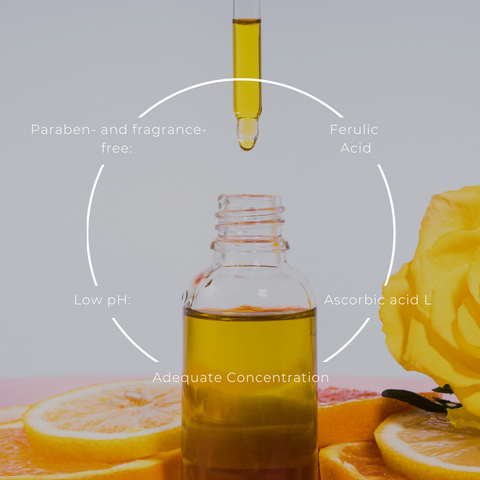
To be effective and safe for your skin, a high-quality vitamin C serum should have particular chemicals and qualities. Look for the following crucial elements and qualities in a vitamin C serum:
-
Ascorbic acid L: The most potent and stable form of vitamin C is ascorbic acid L. It ought to be included in the product's ingredient list as a primary ingredient.
-
Adequate Concentration: An effective vitamin C serum will have a vitamin C concentration ranging from 10% to 20%. Higher concentrations may irritate your skin, so choose a concentration appropriate for your skin type and sensitivity.
-
Low pH: Vitamin C works best in an acidic environment with a low pH (typically less than 3.5). Check the pH of the product to ensure it is within this range.
-
Stabilisers: Vitamin C is prone to oxidation and can be unstable. To help maintain the potency of vitamin C, look for serums that contain stabilisers such as ferulic acid or vitamin E.
-
Hyaluronic Acid: A hydrating ingredient that helps the skin retain moisture and reduces the risk of dryness or irritation, hyaluronic acid is found in many high-quality vitamin C serums.
-
Peptides: Some vitamin C serums contain peptides, which can help collagen production and improve skin texture.
-
Ferulic Acid: This antioxidant can enhance the stability and effectiveness of vitamin C, especially when exposed to UV radiation.
-
Vitamin E: Vitamin E is another antioxidant that can supplement the effects of vitamin C and provide additional protection against free radicals.
-
Niacinamide (Vitamin B3): Niacinamide, when combined with vitamin C, can help brighten the skin, minimise the appearance of pores, and improve the overall texture of the skin.
-
Natural Extracts: Some vitamin C serums contain natural extracts like green tea extract or chamomile extract, which have antioxidant and soothing properties.
-
Paraben- and fragrance-free: To reduce the risk of skin irritation or sensitivity, look for serums that are free of parabens and synthetic fragrances.
-
Airtight and opaque packaging: Vitamin C is light and air-sensitive, which can cause it to degrade. To ensure the serum's stability, store it in an airtight, opaque, and preferably dark glass bottle.
-
Ethical and Cruelty-Free Practises: Consider supporting brands that are cruelty-free and practise ethical and sustainable practises.
When choosing a vitamin C serum, keep your skin type and any unique skincare concerns in mind. Different formulas and extra substances may be better suited to your specific requirements. Additionally, before using a new product, always perform a patch test to check for any adverse reactions. A dermatologist can also assist you in selecting the best vitamin C serum for your unique skin type and goals.
Role of hyaluronic acid in serums
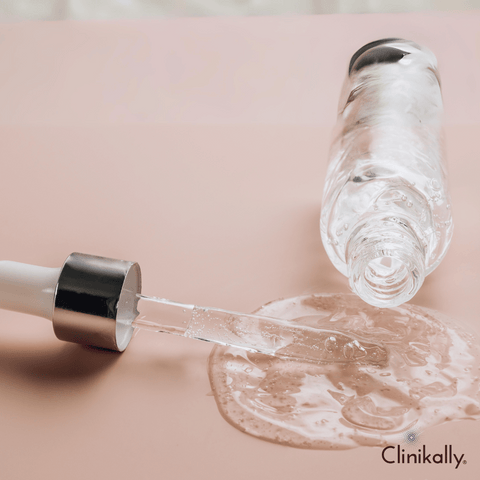
Hyaluronic acid (HA) is a prominent and commonly utilised ingredient in skincare products, particularly serums, due to its ability to give considerable skin benefits. Here are some of the important roles of hyaluronic acid in serums:
-
Hydration and Moisture Retention: Hyaluronic acid is a naturally occurring chemical found in the skin that has an extraordinary ability to store water. It functions as a potent humectant in serums, drawing and holding moisture on the skin's surface. This keeps the skin moisturised, plump, and supple, which is necessary for a healthy skin barrier.
-
Skin Barrier Support: A well-hydrated skin barrier protects the skin from external aggressors such as pollutants and UV radiation. Hyaluronic acid strengthens the skin's natural barrier function, making it more resilient and resistant to injury.
-
Improved Skin Texture: Skin appears smoother and more luminous when it is adequately hydrated. By improving skin texture and providing a healthy, young appearance, hyaluronic acid can help reduce the appearance of fine lines, wrinkles, and roughness.
-
Reduction of Dryness and Flakiness: Hyaluronic acid is very beneficial for people who have dry or dehydrated skin. It can relieve dryness, flakiness, and irritation, bringing relief and comfort to those who suffer from dry skin.
-
Enhanced Product Penetration: In serums, hyaluronic acid can aid in the penetration of other active substances into the skin. When combined with other helpful components, it has the potential to improve their overall performance.
-
Soothing and Calming Properties: Hyaluronic acid is generally well tolerated and has skin-soothing and relaxing properties. It is frequently used to treat skin redness and irritation.
-
Combination with Other Actives: In serums, hyaluronic acid is usually combined with other active substances like vitamin C, niacinamide, and peptides. This combination can result in a thorough skincare plan that treats a variety of skin issues.
-
Boosting Collagen Production: Some research suggests that hyaluronic acid may increase collagen formation, which is necessary for skin suppleness and firmness. This can result in general skin structure improvement and a reduction in the appearance of fine lines and wrinkles.
It's essential to know that hyaluronic acid is generally safe for all skin types, including sensitive skin, and it's frequently found in a variety of skincare products, from serums to moisturisers and masks. When using hyaluronic acid serums, however, it is critical to ensure that the skin is appropriately hydrated, as adding hyaluronic acid to dehydrated skin without sealing in moisture can occasionally result in additional dryness. As a result, it's best to apply hyaluronic acid serums to damp skin and then follow up with a moisturiser to lock in the hydration.
The importance of ferulic acid

Ferulic acid is an important skincare ingredient that provides numerous skin benefits. Here are some of the main reasons why ferulic acid is important in skincare:
-
Antioxidant Protection: Ferulic acid is an extremely effective antioxidant. It protects the skin from free radical damage, which is caused by unstable chemicals that can harm skin cells and accelerate the ageing process. This protection aids in the reduction of fine lines, wrinkles, and other symptoms of aging.
-
Sun Damage Protection: Ferulic acid, when combined with other antioxidants such as vitamin C and vitamin E, can provide increased protection against UV-induced skin damage. This mixture of antioxidants helps to neutralise free radicals produced by UV radiation, lowering the risk of sunburn, photoaging, and skin cancer.
-
Stabilisation of Vitamin C: Ferulic acid is well-known for its capacity to stabilise and improve the efficacy of vitamin C (ascorbic acid) in skincare products. It can lengthen the shelf life of vitamin C serum and improve its overall effectiveness when used in conjunction with vitamin C.
-
Skin Brightening: Ferulic acid can help lighten the skin by lowering the visibility of pigmentation disorders like sunspots and age spots. It reduces melanin formation, resulting in a more even skin tone and a luminous complexion.
-
Anti-Inflammatory Properties: The anti-inflammatory qualities of ferulic acid can help calm irritated skin and lessen redness. It is therefore a useful ingredient for people whose skin is reactive or sensitive.
-
Protection of Collagen: Ferulic acid has the potential to shield the skin's elastin and collagen fibres. These proteins are necessary to preserve the firmness and elasticity of the skin. Ferulic acid helps smooth out wrinkles and make skin appear younger by stopping their breakdown.
-
Prevention of Environmental Damage: The protective properties of ferulic acid help prevent pollution, smoke, and other environmental stressors from harming skin. It serves as a shield against toxins that can aggravate dullness and other skin issues.
-
Combination with Other Actives: Vitamin C, niacinamide, and hyaluronic acid are a few examples of ingredients that are frequently combined with ferulic acid in skincare products. This combination creates a comprehensive and effective skincare regimen that addresses various skin concerns.
While ferulic acid is usually considered safe and suitable for most skin types, a patch test should be performed before using products containing this component to check for any adverse effects, especially if you have sensitive or reactive skin. A dermatologist or skincare specialist can also provide personalised advice on how to use ferulic acid in your skincare routine.
Magnesium ascorbyl phosphate: A stable form of Vitamin C
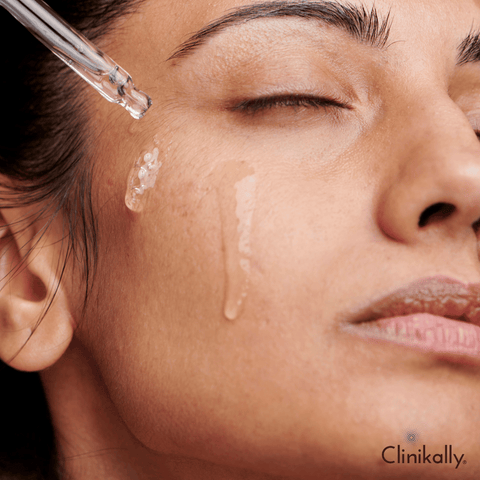
Magnesium ascorbyl phosphate (MAP) is a stable and water-soluble vitamin C (ascorbic acid) derivative that is often utilised in cosmetic products. It provides various benefits to people who want to add vitamin C to their beauty routine. What you should know about magnesium ascorbyl phosphate is as follows:
-
Stability: Magnesium ascorbyl phosphate is more stable than pure ascorbic acid, which is very susceptible to light, air, and temperature. This means it is less susceptible to oxidation, which can result in a decline in effectiveness as well as a change in the color or aroma of the product.
-
Gentle on the Skin: MAP is a milder type of vitamin C, making it suited for people with sensitive skin. It is less likely to induce irritation, redness, or stinging, making it an excellent choice for those who do not tolerate pure ascorbic acid well.
-
Antioxidant Properties: MAP, like ascorbic acid, is an antioxidant that aids in the protection of the skin from free radicals and oxidative stress. It has the ability to neutralise these toxic chemicals, which can cause accelerated aging and skin damage.
-
Skin Brightening: MAP may help lighten the skin by minimising the visibility of pigmentation disorders including sunspots and aging spots. It reduces melanin formation, which results in a more equal skin tone.
-
Collagen Support: It has the ability to increase collagen formation, which aids in the maintenance of skin suppleness and firmness. This can result in general skin texture improvement and a reduction in the appearance of fine lines and wrinkles.
-
Moisturisation: MAP is a water-soluble chemical that can moisturise the skin. It aids in the retention of moisture in the skin, resulting in a more supple and plump complexion.
-
Reduced Risk of Sensitivity: Because of its gentle nature, MAP is less likely to induce sensitivities or allergic responses, making it an excellent choice for those with different skin types.
While MAP is a stable and effective form of vitamin C, its potency may be slightly decreased when compared to pure ascorbic acid. This can be beneficial for people with sensitive skin or those who are new to taking vitamin C in their skincare routine. When selecting magnesium ascorbyl phosphate-containing skincare products, evaluate the total formulation, as other compounds can affect the product's performance and compatibility with your specific skin conditions. When testing a new product, always perform a patch test to confirm that it is suitable for your skin and does not cause any unpleasant effects.
Side effects and precautions of using Vitamin C serum
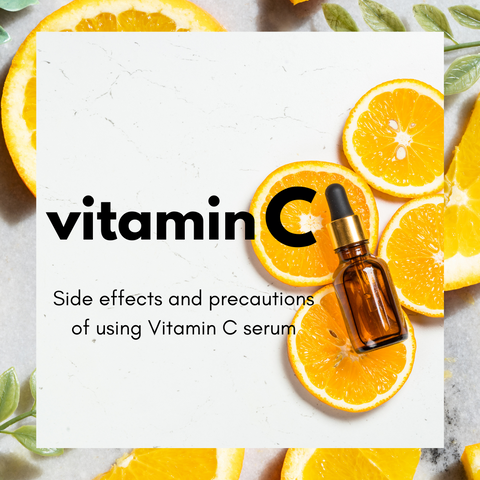
Vitamin C serum is generally well-tolerated by most individuals when used correctly. However, as with any skincare product, it can cause side effects or adverse reactions in some people, particularly if used incorrectly or by people with sensitive or reactive skin. The following are some possible side effects and precautions to take when using a vitamin C serum:
Side Effects:
-
Skin Irritation: Vitamin C serums, particularly those with high ascorbic acid concentrations, can cause skin irritation such as redness, itching, burning, or stinging. This is more likely if you have sensitive skin or use a product with a high concentration of vitamin C.
-
Dryness or flakiness: In some cases, vitamin C serums can cause dryness or flakiness, especially if they are not followed by a moisturiser. Make sure your skin stays sufficiently hydrated when applying vitamin C.
-
Allergic Reactions: Although uncommon, some people may be allergic to specific ingredients in vitamin C serum. If you develop hives, swelling, or severe itching, stop using the product and seek medical attention.
Precautions:
-
Patch Test: Perform a patch test on a small area of your skin before applying a vitamin C serum to your complete face to check for any unwanted effects. This is especially critical if you have sensitive skin.
-
Sun Sensitivity: Vitamin C may make your skin more sensitive to the sun. Every day, apply a broad-spectrum sunscreen with at least SPF 30, especially if you use vitamin C in your morning skincare routine.
-
Gradual Introduction: If you're new to utilising vitamin C, ease it into your beauty routine gradually. Begin with lower concentrations and gradually raise the strength to allow your skin to adjust.
-
Storage Instructions: Keep your vitamin C serum cool and dark, away from direct sunlight and air exposure. Vitamin C is light-sensitive and can degrade if not stored properly.
-
Avoid Combining with Certain Ingredients: Use caution when combining vitamin C with retinoids (retinol) and benzoyl peroxide, as they can be irritating when combined. It is best to use them at different times or seek advice from a dermatologist.
-
Consistency: Use the vitamin C serum on a regular basis to get noticeable benefits. It could take a few weeks or even months before results are apparent.
Speak with a dermatologist or skincare expert if you have severe or ongoing side effects or if you are not sure if vitamin C is right for your particular skin type. They are able to offer tailored advice and suggest the ideal products and regimen based on your skincare objectives and concerns.
How to perform a patch test
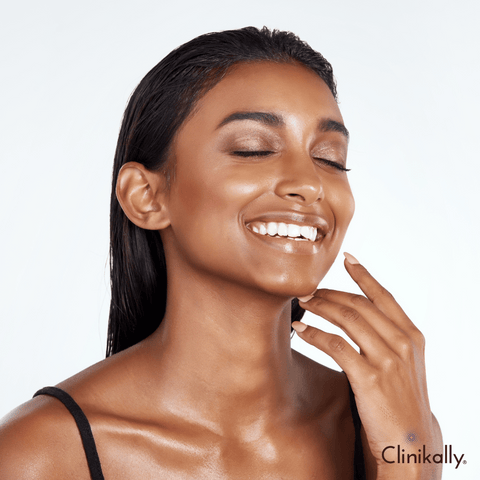
A patch test is a quick and easy way to see how your skin reacts to a new skincare product, especially if you have sensitive skin or are trying something with active ingredients like vitamin C. Here's how to do a patch test:
-
Clean the Test Area: To ensure that the patch of skin you'll be testing is free of any other products or pollutants, wash it with a gentle cleanser and water. Using a clean towel, pat it dry.
-
Apply a Small Amount of the Product: Apply a small amount of the substance to be tested, such as vitamin C serum, to the test region. For precise application, use a cotton swab or a clean fingertip. Make sure you use a controlled amount.
-
Wait and Observe: Allow the substance to sink into the skin and dry. Allow it to sit in the test area for a specified amount of time (typically 24 hours).
-
Avoid Washing or Touching the Test Area: Avoid cleaning or touching the test area throughout the testing period. This will aid in correctly observing the product's impact on your skin.
-
Observe for Reactions: Check the test area on a regular basis throughout the 24-hour period, especially after the first few hours. Check for redness, itching, burning, stinging, swelling, or a rash. If you encounter any of these side effects, wash the product immediately and stop using it.
-
Post-Test Evaluation: Examine the test area again after 24 hours. If you haven't had any negative reactions, the product is probably safe for your skin. If you experience any bad skin reactions, stop using the cream on your face and visit a physician.
-
Patch Test for Several Days: In some circumstances, particularly if you have sensitive skin, you may wish to spread out the patch test over several days to ensure that your skin does not respond poorly after lengthy use.
Remember that patch testing is a preventative step to reduce the chance of bad reactions, but it does not guarantee that you will not have problems when applying a product to your face. Following the patch test, if you are certain that the product is safe, you can incorporate it into your usual skincare routine by following the product's usage recommendations. If you have any reservations or concerns about how your skin will react to a product, you should seek the advice of a dermatologist.
Common reactions and how to address them
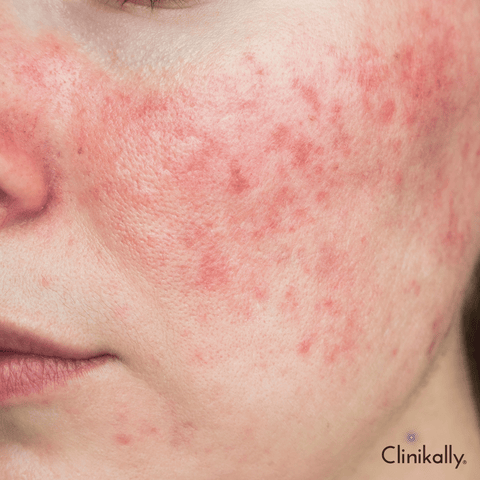
Irritation, redness, dryness, and breakouts are all common reactions to skincare products, including vitamin C serums. Here's how to deal with some of the most prevalent reactions:
-
Irritation (redness, itching, burning, or stinging): If you notice irritation, discontinue use immediately. To remove the product, rinse your skin with cool water. After rinsing, use a light, fragrance-free moisturiser on the skin to help soothe it. Look for products that contain aloe vera or colloidal oatmeal as components. For a few days, avoid using any other skincare products that contain potentially irritating components, such as retinoids or alpha hydroxy acids (AHAs).
-
Dryness or Flakiness: Use a soft, moisturising product that is free of scents and irritants to increase the moisture of your skin. Apply moisturiser as often as necessary to keep your skin hydrated. To lock in moisture and prevent water loss, apply a thin layer of an occlusive moisturiser containing petrolatum or dimethicone. Avoid strong soaps or cleansers that might further dry up your skin by using a light, moisturising cleanser.
-
Breakouts (Acne or Bumps): Stop using the product that produced the breakouts. It may contain chemicals that clog or irritate your pores. If outbreaks persist, apply acne-fighting treatments containing salicylic acid or benzoyl peroxide. To avoid over-drying your skin, use them gradually. Consult a dermatologist for advice and potential treatment options if your breakouts are severe or do not improve.
-
Allergic Reactions (hives, swelling, severe itching): Stop using the product immediately and wash your face with cool water to eliminate any residual residue. Seek medical care right away if you have severe allergic reactions, such as hives, swelling, or difficulty breathing.
-
Sun Sensitivity: If your skin becomes more sun sensitive, it's critical to use a broad-spectrum sunscreen with an SPF of at least 30 every day, especially in the morning when utilising vitamin C. This will help protect your skin from UV damage and inflammation.
-
Patch Test: Consider completing a patch test before applying a new product to your full face when adding new items to your skincare routine, especially if you have sensitive skin.
In many cases, unpleasant reactions to skincare products can be addressed by halting use and providing gentle care and moisture to your skin. If your reactions persist or worsen, or if you have specific skin concerns, get personalised advice and potential treatment options from a dermatologist or skincare professional.








































